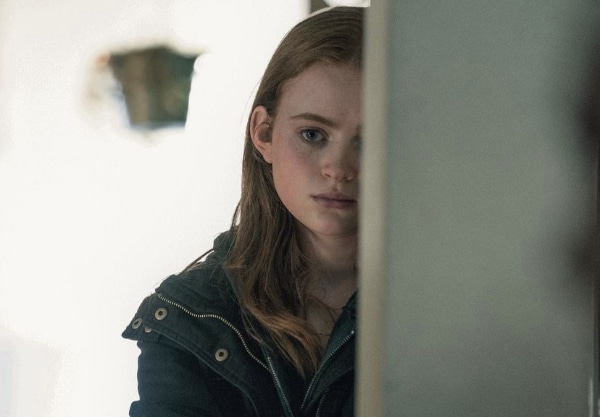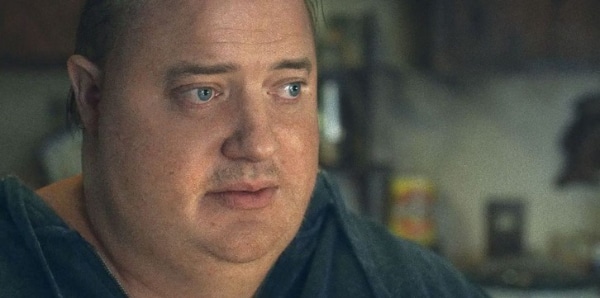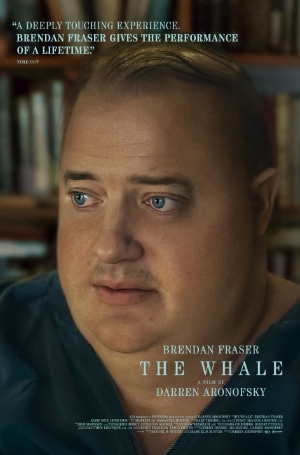There has been tons of buzz about Brendan Fraser’s “performance of a lifetime” in the new film, The Whale. After seeing it, I would have to agree with all the hoopla. His acting in this film will knock your socks off. The story is as about as human as it can get with the darkness and the light vying with each other for dominance in this broken man’s soul.
Charlie (Fraser) is a 600-pound, homosexual English professor who teaches online courses. Ashamed of his body, he tells his students that his laptop’s camera is busted. But there’s a lot more that’s busted in this man’s life than just his camera (which is working perfectly fine).
Based on the play by Samuel D. Hunter (who also penned the screenplay), and directed by Darren Aronofsky, The Whale takes place almost exclusively in the living room of Charlie’s 2nd floor apartment in an unnamed Idaho town. That might sound like it could turn into a snooze fest, but Aronofsky’s talent with moving Charlie and others to various parts of the home, keeps the film fresh and engaging.
Immediately upon seeing Charlie, we wonder what happened to bring this man to where he is, a morbidly obese binge eater, watching gay porn and having severe chest pains and spiking blood pressure after the exertion of pleasuring himself (thank God it’s not explicit). Only a few people are allowed in the darkened home. There’s Liz (Hong Chau), his caregiver and friend. There’s Thomas (Ty Simpkins), who surprises Charlie one day by knocking on his door needing to borrow a phone. There’s Ellie (Sadie Sink), Charlie’s teenage daughter, who seems to be angry with the whole world, and Mary (Samantha Morton), Charlie’s ex-wife, whom he left eight years prior after falling in love with another man. Dan (Sathya Sridharan), who delivers many pizzas to Charlie’s home, only knows the home’s occupant as a voice on the other side of the door.

Liz keeps telling Charlie that if he won’t go to the hospital, which he refuses to do, he’ll die within a week. Realizing that his end is probably near, he seeks to repair his relationship with his daughter.

Throughout the unfolding of the story, we learn more of Charlie’s backstory. The pain and suffering that brought him to where he is cries out for compassion and understanding. For audience members who have faith, and for anyone else really, Charlie’s despairing downward spiral is very difficult to watch, but so humanly portrayed and relatable. In one heartbreaking scene, he eats himself through two pizzas, anything from the fridge and a potato chip sandwich, showing just how broken this person is.
The way religion is treated in the film could be uncomfortable for viewers of faith, as well. The character of Thomas is a naive, Mormon-like missionary from the nearby New Life Church, and he decides that God led him to knock on Charlie’s door that day for a reason: to save Charlie. But Charlie doesn’t want saving. He’s experienced what attempts at ‘salvation’ did to his partner.

But that doesn’t mean that redemption isn’t a huge theme in this film. Each character, in his or her own way, needs some kind of redemption, forgiveness, or simply letting the light in their lives break through the darkness they have experienced.
When thinking about this film, the phrase “hate the sin but love the sinner” comes to mind. In The Whale, Charlie is honest that he and Alan were an active couple when Thomas wants to condemn him for it. The movie shows in a deeply human way what can happen when people forget about the “love the sinner” part and only dole out judgement.
We all have both darkness and light within us. We all have a need for redemption. Everyone. What a tragedy it is when people, especially believers, who claim to be compassionate, loving, and forgiving, fail to pass those on to others whom they don’t think deserve them because of their choices in life.
This may sound cliché, but it’s worth repeating. Always be kind because you never know what someone else is going through.



